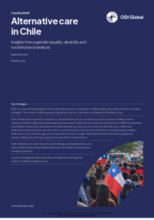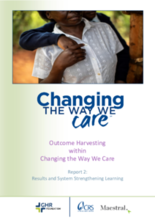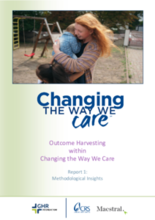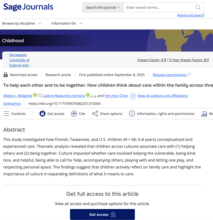This page contains documents and other resources related to children's care in the Americas. Browse resources by region, country, or category.
Displaying 31 - 40 of 3192
Changing the Way We Care (CTWWC) is a global initiative which promotes safe, nurturing family care for children.
This Reuters article reports that the Trump administration is offering unaccompanied migrant children in U.S. custody a one-time stipend of US $2,500 to voluntarily return to their countries of origin.
This brief analyses the state of alternative care for children in Chile, highlighting key statistics, sectoral findings and areas for policy improvement. It is part of a broader analysis of gender equality, disability and social inclusion (GEDSI) in Chile. The analysis draws on existing literature, government reports and key informant interviews (KIIs) with stakeholders working in this area.
At the close of the Changing the Way We Care (CTWWC) The Changing the Way We Care (CTWWC) initiative launched in 2018 with the aim to reform child care systems by promoting safe, nurturing family-based care over institutional ca
At the close of the Changing the Way We Care (CTWWC) The Changing the Way We Care (CTWWC) initiative launched in 2018 with the aim to reform child care systems by promoting safe, nurturing family-based care over institutional ca
This Washington Post article focuses on how ICE officers are ramping up arrests in the United States, leaving hundreds of migrant children to be sent to federal shelters.
This paper outlines a research agenda to guide the initial stages of work of the new Notre Dame Strengthening Families (NDSF) Research Initiative in the U.S. This initiative is focused on building knowledge around the economics of families and evidence-based ways to promote and strengthen healthy families.
This study investigated how Finnish, Taiwanese, and U.S. children conceptualized and experienced care.
Este documento es un estudio de caso basado en la historia de transformación del Hogar Esquipulas, liderada por la Asociación de Religiosas Franciscanas de San Antonio en Esquipulas, Chiquimula, Guatemala, representa un testimonio inspirador del compromiso profundo con el bienestar de los niños, niñas y adolescentes.
This article notes how a U.S. federal judge has temporarily blocked the Trump administration from deporting dozens of unaccompanied Guatemalan children, following reports they had been placed on planes for return under a new pilot program.







